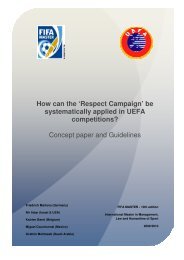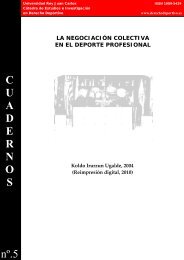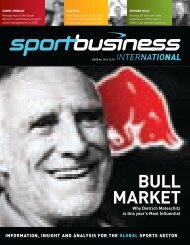Sports Marketing & Sponsorship - FIFA/CIES International University ...
Sports Marketing & Sponsorship - FIFA/CIES International University ...
Sports Marketing & Sponsorship - FIFA/CIES International University ...
- No tags were found...
Create successful ePaper yourself
Turn your PDF publications into a flip-book with our unique Google optimized e-Paper software.
Sustaining the raceof sustainability are considered, and the latest UnitedNations environmental assessment is drawn upon toplace sport, and specifically motorsport, in a globalenvironmental context.Literature pertaining to sustainability and sport isreviewed and an analysis of the role of materialconsumption practices is offered. The paper thenevaluates some attempts within motorsport to becomemore sustainable. The paper concludes that furtherresearch into sustainable management and marketingpractices for motorsport is warranted.IntroductionMotorsport is an important part of the social andcommercial fabric of industrialised societies. Aroundthe world, it occupies an important place in popularand sporting culture. From the Silverstone,Nürburgring and Monaco Formula One racetracks inEurope to Canada’s Circuit Gilles-Villenueve in NorthAmerica to Brazil’s Interlagos in South America to theShanghai <strong>International</strong> Circuit in China and the desertplains of Africa for the Paris-Dakar Rally to the longstraights of Australia’s Mount Panorama, Bathurst andPhillip Island, in its various forms motorsport is ofboth historic and global significance.As a sport it is also very diverse: the term ‘motorsport’encompasses a range of major categories of racing. Forfour-wheeled vehicles alone there is a multitude offorms: Formula One, Indy Car, Stock Car, Rally, DragRacing, Go-Karts, Dune Buggies and trucks are justsome. Motorbikes race in several varieties, includingSuperbikes, Motocross, Quad Bikes and the derivativeSnocross competitions. While motorsport is principally aland-based activity, it also extends to onshore andoffshore speedboat racing. Many categories ofmotorsport are further divided into sub-categories – onroador track racing and off-road racing. Within eachmajor category, motorsport is further divided into arange of competitions according to body type, enginecapacity and vehicle manufacturer, each with their ownidiosyncrasies and technical requirements.All varieties of motorsport, however, have two keycommonalities. The first is that the participants placegreat value on competitiveness – the winning ofcompetitions and how this is achieved. As a result, therecording, quantification and measurement of progresstowards winning is a typical characteristic; and speed,engine size, engine power and aerodynamic efficiencyare widely discussed by participants, commentators andfans. The second commonality is that all strands ofmotorsport share a dependence on the physicalresources of planet Earth, and for most, a heavyreliance on crude oil as an energy source for propulsion.In recent years, the emergence of the environmentgenerally, and the phenomenon of anthropogenicclimate change in particular, as global social, politicaland economic issues is prompting a re-examination ofmany forms of human activity. How we use energy,and the sources from which we derive it, is nowwidely debated in the spheres of government,commerce and among citizens. While motorsport iswidely reported in electronic and print media aroundthe globe, there has been very little academic researchinto the environmental sustainability of the sport. Thispaper aims to review a selection of literaturepertaining to motorsport and sustainability in order tomake a contribution to understanding whethermotorsport, in a broad sense, is an environmentallysustainable practice.A wealth of research in recent years suggests thatconsumption-driven human civilisation has, and willcontinue to have, a very negative impact on our planetacross a range of measures – including land, water,atmosphere and biodiversity. It is axiomatic that thisdegradation and pollution is a consequence of theconsumption of our natural resources. As a result, thecontinuance of current human consumption-basedactivity, including some sport, is increasingly drawninto question. While motorsport is a significantexample of such sporting activity, for both economicand social reasons, our understanding of motorsport’srelationship within our environment, and how itimpacts upon our environment, is not widelydiscussed or evaluated.RESEARCH PAPER● OCTOBER 2009 ● <strong>International</strong> Journal of <strong>Sports</strong> <strong>Marketing</strong> & <strong>Sponsorship</strong>81
















